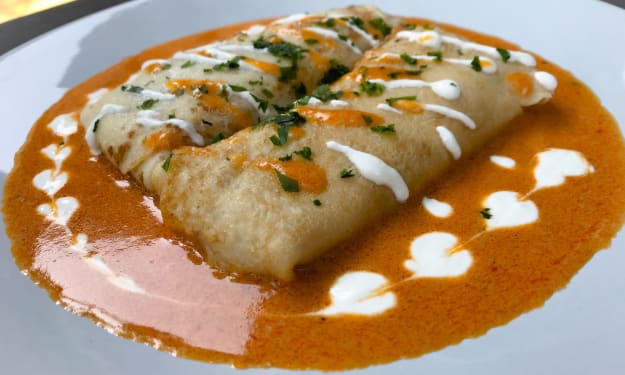How To Improve Your Palate
Learn how to be a taste ninja.

If you’ve ever listened to a beer sommelier, whisky nose or wine master talking and wondered how someone can taste all those flavours in a single sip (petrol, grass or hammy,) the answer is practice.
Yes, some people naturally have a better palate than others but we can all improve with training and practice to improve our palate and discover techniques to help us recognise the subtlest flavour profile as it develops on our palate to turn our experiencing of eating food into a journey. Being a chef is dependent on having a good food knowledge and an expert palate but most of us (chefs) still have to work at improving our palate through training and practice. Wine, beer, whiskey and coffee experts taste lots of different things, use aroma wheels and nosing kits to train their nose to recognise fruits blossoms, herbs and spices.
Know the Basic Tastes
There are five basic tastes:
Sweet, salty, sour, bitter, and umami.
It’s important to know how to tell the differences of these flavours.
Sweet, salty, bitter and sour are easy to discern because we all have experience of these. Umami is the newest and is also known as savoury. Things like meat, ripe tomatoes, mushrooms and cheese are often described as umami.
However, I find that a lot of foods are a combination of flavours. Fruit can be both sweet and sour, dark chocolate can taste sweet and bitter and some cheeses can taste both salty and have that umami flavour.
When foods are combined, we will get a little taste of everything, but we have to be able to recognise it. We can learn to recognise it by tasting foods on their own, paying attention to the aromas they give off.
Explore
If you are serious about wanting to improve you have to try new and exotic foods. There are plenty of foods that at first glance can seem disgusting: Offal, smelly cheeses, fermented shark, new meats or green juice made with buckwheat.
You have to force yourself to try something new if you have the chance. How will you know you don’t like it until you try? Remember you don’t have to like it to know how it tastes the next time you’re in an ethnic restaurant, order something you’ve never heard of and taste it. Or, if you’re traveling to a foreign country, try every single food that is offered to you, no matter how unappealing it sounds (try it with your eyes closed first).
The only way to improve your palate is to constantly hit it with new flavours and textures training your taste buds to recognise new flavours and combinations should be fun.
Try to set some time aside once or twice a week and do a palate cleansing exercise. Get a collection of new foods and try them on their own. Things like olives, herbs, spices, fruits, and vegetables, chocolate or wine. A good drill is to have a selection of diluted citrus juices (orange, tangerine, bergamot, lemon, lime, grapefruit). And taste them get used to their taste, then try the same thing blind. There is a whole world of herbs spices out there, spices you've never even tried before. By experimenting you'll introduce your palate to new flavours and be able to differentiate between those tastes. Once we are able to recognise different herbs spices, you will enjoy new foods and world cuisines even more – and be able to pick out all the different elements in them. Taste each one, savour it and let new flavours explode in your mouth as you eat, pay attention to flavours, textures and smells. Notice how they evolve as you eat them, and take notes on what you think you taste. Repeat with the same foods but introduce new ones with every session. You can do this alone or with a friend. Don’t forget: cleanse your palate between each food to make sure you’re getting the full experience.
Slow Down
To expand your palate, you need to think while you eat. Take a bite of food, close your eyes and savour it. Think about each of the flavours that are present. Think about what you’re doing when you eat. Are you listening to the radio? Having a conversation? Driving? You have to SLOW DOWN, chew and savour each bite. While most of us can tell whether the food we are eating is satisfying or not while doing other things, it can be difficult to tell what it tastes like. We don’t taste each and every herb and spice in a spaghetti sauce, or all the seasoning on our popcorn. Even tasting something simple like fresh herbs can be surprising when you actually put some thought into it. We need to think while we eat. Take a bite of food, close your eyes, and savour it. Think about the flavours that are present. If you’ve ever taken a wine tasting class, this is very similar.
Use All of Your Senses
All our senses play a part in our eating experience. Between 70 and 90% of all we experience as flavour is influenced by aroma, not taste and our senses often affect the way you react to food. If we see something unappetising, for instance, we are going to make an assumption that it tastes bad, when it could be the most delicious thing we have ever tried. We have to rely on sight, smell, and touch, of course, but we shouldn’t let them get in our way. Try eating in the dark sometimes see what if any difference it makes.
Cleanse Your Palate
When we eat a meal, we eat a bite of this, followed by a bite of that and then a bite of something else. You may go from course to course, simply eating and enjoying your food but do you taste each and every thing? Depending on what you’re eating, it’s likely that you’re not, although this doesn’t mean you’re not enjoying it. If we go on a culinary adventure, we need to keep our palate cleansed and fresh. If we don't, each course will contain hints of the last and that will interfere with our experience of the next dish. Try Sorbet, suck an orange or lemon wedge, eat a plain cracker or dry bread will all help. Drink plenty of water, too!
Try to Cut Down on Salt & Sugar
Sugar severely affects our palate. If you find that you have trouble tasting different foods, or discerning flavours in cooked dishes, it could very well be because you are eating too much sugar. Try cutting back and see what difference it makes to your taste buds. Sugar hides in unusual places so read nutrition labels before buying.
Salt excites our taste buds and makes things taste stronger than they should. As we get older we lose up to half of our taste buds so need to use salt more for the same effect. Salt has its place, but try not to over-salt your food. Try leaving the salt out for a week, which should make it much easier to recognise other herbs and spices.
In Conclusion
To fully recognise and enjoy a wide range of foods we have to be able to taste them properly. There’s a huge difference between enjoying a meal and really tasting every ingredient and infusion of flavour and that goes into it.
Learning how to train our palate can be as simple as slowing down to pay attention to what we eat, looking at it to create expectation, as well as being aware of other factors, such as smoking, that will affect our taste buds in a big way. It's not rocket science and but if we just slow down and contemplate whilst you masticate we are well on our way to having a more discerning palate.
About the Creator
David Greenwood-Haigh
Multi award-winning chocolatier with over forty years experience.fellow of the institute of hospitality, MasterChef member Craft Guild of Chefs Judges International chocolate awards, Academy of chocolate awards & Great taste awards






Comments
There are no comments for this story
Be the first to respond and start the conversation.